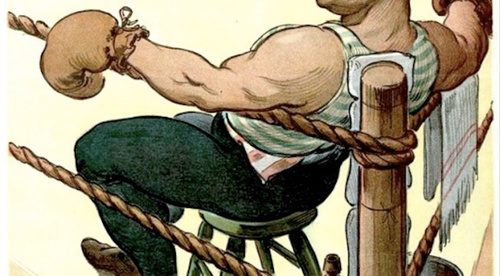Teddy Roosevelt’s Secret

“In the land of the blind,” the idiom goes, “the one-eyed man is king.” The origins of that saying are murky at best but one thing’s for sure — it’s not a reference to Teddy Roosevelt. First, the idiom is centuries old; Roosevelt was President only about one hundred and ten years ago. Second, Roosevelt wasn’t a king. And third, unless you have a particular disdain for the politics of the era, there’s no reason to believe that America at the dawn of the twentieth century was particularly blind.
Its president, though, partially was. But secretively.
President Roosevelt was an accomplished boxer; at Harvard, he once came in second-place in a campus boxing tournament. Boxing, for TR, wasn’t just a hobby. He had severe asthma as a young child, often to the point of being debilitating. He found that hiking trips were one of the few times that his asthma was kept at bay. After he was roughed up by some other kids on one his many adolescent camping trips, Roosevelt convinced his parents to let him take boxing lessons. The exercise regimen that went with boxing again helped with his asthma. Roosevelt would later conclude that heavy amounts of exercise focused on overcoming your weakness — a “strenuous life,” as he’d term it — was the key to a lifetime of successes. Over the course of his life, he’d add many different sports to his repertoire.
When Roosevelt was elected Governor of New York in 1899, some of those sports would have to go away due to time constraints. A governor can play tennis here and there, as Roosevelt did, or go horseback riding or hunting on occasion. Hunting, despite being somewhat dangerous, was something he’d certainly never give up — Roosevelt is believed to have successfully killed or trapped more than 10,000 animals during his lifetime. But boxing? One would have expected him to drop that all together — a governor getting a concussion or other boxing-related injury is probably best avoided — but Roosevelt continued on as a pugilist. A few times each week, he’d get in the ring to spar.
Roosevelt’s time as governor was short — before his first term was up, he was elected Vice President of the United States. His time as governor came to a close on December 31, 1900, and he went to Washington shortly thereafter, serving under President William McKinley. The VP role, as it is now, had few prescribed duties, so Teddy probably had lots of time to continue boxing. But in September of 1901, McKinley was felled by an assassin’s bullet. Theodore Roosevelt became the 26th President of the United States on September 14, 1901.
And, even as President, he continued boxing. He may have even ramped it up a bit. According to the History Channel, “he regularly put up his dukes against former professional boxers” when in the White House — after all, who is going to turn down the President’s invitation to come to Washington for a meet and greet (and to spar)?
Unfortunately for President Roosevelt, his final time in the ring didn’t end well. In 1908, per the Chicago Tribune, “an opponent landed a punch to the [the 50-year-old] president’s left eye,” causing “severe hemorrhaging, eventually a detached retina, and finally blindness in the eye.” But Teddy didn’t immediately admit this to the American people — not during his final year in office nor during his subsequent run as a third-party candidate in 1912, at least. Ultimately, in his autobiography, published in 1913, he admitted that a boxing match left him “dim” in the left eye. He didn’t grouse, though. Rather, he took an optimistic approach — at least it didn’t interfere with his love of hunting. “If it had been the right eye,” Roosevelt noted, “I should have been entirely unable to shoot.”
Bonus fact: In 1895, Roosevelt became the commissioner of the New York City Police Department, a position he held for two years. The police force he inherited was known to be corrupt, with many officers simply not doing their jobs. Roosevelt took matters into his own hands; per Wikipedia, he “made a habit of walking officers’ beats late at night and early in the morning to make sure that they were on duty.”
From the Archives: Teddy Versus the Pigskin: More on Theodore Roosevelt. The bonus item is particularly relevant to the main story today.
